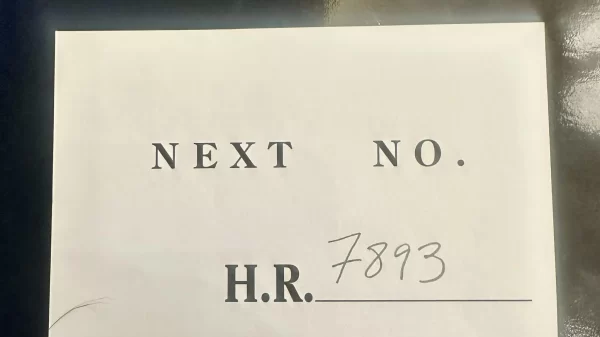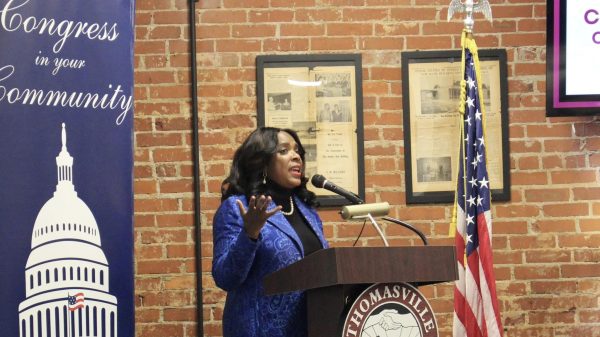By Sam McLure
Alabama Political Reporter
Politics is No Place for the Invisible Hand of Capitalism
In the early 20th century, G.K. Chesterton responded to a newspaper inquiry which asked readers to send in answers to a pressing question: “What is wrong with the world?” Chesterton’s write-in response was, “Dear Sir: Regarding your article ‘What’s Wrong with the World?’ I am. Yours truly, G.K. Chesterton.”
Any analysis of greed in politics must start with this kind of humility. We must acknowledge that the test of influence is far more perilous than the test of obscurity. With more power comes more opportunity for greed – more opportunity to use our position and influence to promote ourselves to the detriment of our neighbor.
This accurate self-assessment, is, in-part, what drove the founders of our government to establish safeguards to prevent too great a consolidation of governmental prowess. No man is up to the task of absolute power. In an ideal world, everyone would be as reluctant to acquire power as George Washington, who had to be begged into the Presidency. But, we do not live in an ideal world. We live in a very fallen world. Thus, in 2017 we must accurately diagnose occurrences of greed in politics and consider how to restrain the opportunity for acting on it, just as the founders of America did in 1776.
In our Introduction with Mr. Blue Suit, we explored a satirical analogy of greed in politics; and in Part I, we highlighted Sen. Calhoun’s observation that, behind the scenes of both political parties, there is a group of “active politicians”, controlled by greed, with whom “a regard for principle or this or that line of policy is a mere pretext. They’re perfectly indifferent to either and their whole effort is to make up on both sides such issues as they may think for the time the most popular, regardless of truth or consequences.”
Sen. Calhoun also observed “that our whole system is rapidly becoming a mere money-making concern to those who have the control of it.” And that “every feeling of patriotism is rapidly sinking into a universal spirit of [greed].”
On this point I must disagree with Sen. Calhoun; he could have benefited from a little more historical perspective. The American governmental system was not “rapidly becoming” consumed with and controlled by greed. On the contrary, this has always been the bent of government. As long as fallen men and women have the reigns of power, the most difficult questions of proper governing will revolve around how to restrain vicious greed in politics.
Adam Smith, Wealth of Nations
The same year the American Declaration of Independence was submitted to the Crown, Adam Smith submitted his treatise to the world, An Inquiry into the Nature and Causes of the Wealth of Nations. The notion of capitalism’s “Invisible Hand” and the great benefits of free trade between countries are some of the more conspicuous attributes of Smith’s work.
A less known attribute is Smith’s disdain for business-conglomerate-interests which tend to control governments for their own greedy interests, in violation of the free market, and to the detriment of the community.
“[T]he cruelest of our revenue laws . . . are mild and gentle, in comparison to some of those which the clamour of our merchants and manufacturers has extorted from the legislature, for the support of their own absurd and oppressive monopolies. Like the laws of Draco, these laws may be said to be all written in blood.”
“The capricious ambition of kings and ministers has not, during the present century, been more fatal to the repose of Europe, than the impertinent jealousy of merchants and manufactures.”
“It is the industry which is carried on for the benefit of the rich and the powerful, that is principally encouraged by our mercantile system. That which is carried on for the benefit of the poor and the indigent is too often either neglected or oppressed.”
Where do we find greed in Alabama Politics?
The examples of greed in Alabama politics are as ubiquitous as the aroma of peanuts in the Wiregrass. We need look no further than Oliver Robinson, Luther Strange, Mike Hubbard, or Blue Cross Blue Shield of Alabama’s monopoly on health insurance.
The atrocities of greed are grievous regardless of party affiliation. No five year old dreams of growing up to be a greedy bastard. Children dream of being pure-hearted superheroes, or talented athletes, or kind and beautiful princesses. Greed perverts the good intentions of our hearts in small and great ways every day. It is thus incumbent upon those endowed with the public trust, our elected officials, to rigorously and daily subject themselves to the highest levels of scrutiny.
Lobbying for “Business Interests” to the Detriment of the Community
Prowling in the shadowlands of Alabama politics are two, so-called, non-profits which posses such a conglomeration of power over the processes of Alabama’s government, that they are inevitably used for greed: Business Council of Alabama (BCA) and the Medical Association of Alabama (MASA). And, by “used for greed,” I do not mean that they only perpetuate policies of greed which serve a detriment to the community. They often exude noble goals for the good of the entire state. Their employees and members are not all evil actors consumed with greed. Their lobbyist aren’t all secretly serpentine sewer dwellers.
Yet, what they posses is such a conglomeration of power over the processes of government, that they are inevitably leveraged for greed.
Again, Adam Smith explains:
“It cannot be very difficult to determine who have been the contrivers of this whole mercantile system; not the consumers, we may believe, whose interest has been entirely neglected; but the producers, whose interest has been so carefully attended to and among this latter class, our merchants and manufacturers have been by far the principal architects. In the mercantile regulations … the interest of our manufacturers has been most peculiarly attended to; and the interest, not so much of the consumers, as that of some other sets of producers, has been sacrificed to it.”
The first red-flag to notice about BCA is that the CEO of this “non-profit” takes home a salary that is 1,500 percent higher than the average Alabamian’s income, not to mention his complimentary Montgomery Country Club membership. There is nothing a-moral about earning such a salary, but there are two things which should alarm us, right off the bat. First, Bill Canary and the BCA are lying. The mantle of “non-profit” is a farce when the CEO takes home $600,000 in salary. Second, living at this level of economic elitism, 1,500 percent above average, has the tendency to make a man 1,500 degrees out of touch with the average Alabamian – out of touch with the community and what serves its good.
The second red-flag is that almost nobody in the Yellowhammer State spends more on influencing elections than BCA. In the last election cycle, BCA spent almost $250,000 just on ensuring that the two most powerful men in the Legislature, Mike Hubbard and Del Marsh, were re-elected … Not to mention dozens of other candidates from both major parties.
Is this inherently evil? No. It is not. But, it endows BCA with, at least, the reputation of being able to get anyone they want elected. It has the tendency to send a message to any politician who opposes their agenda, “Vote the way we want you to vote, or you will not be sitting here after the next election. We will find someone more ‘business friendly’ to run against you, and will mega-fund their campaign.”
While this business-interest-power-conglomeration is not inherently evil, the net effect of the intoxication of its power gave Bill Canary the audacity to track down a Legislator in the halls of the State House and publicly wag his finger in this Legislators face demanding an account: “What were you thinking introducing that bill! You didn’t get our permission!” If Bill Canary is so brazen as to do this in public, we must wonder what cupidity transcends in private.
A third red flag we should notice is the irregularities in the source and frequency of contributions to BCA’s political action committee, Progress PAC. Most donations are from hundreds of different business in the $200-$300 dollar range. Then there is the seemingly “random” donation of $15,000 from a towing company or $10,000 from a major law firm. Gaining an explanation for these amounts and what specific benefit the larger “sporadic” donors hope to obtain, is a veil that perhaps only the Alabama Attorney General can pierce.
Politics is No Place for the Invisible Hand of Capitalism
Some of the initiatives that BCA has pursued seem noble and good for “the body of people” – like tort reform. While BCA’s stated mission is “to improve industry and labor conditions for the State of Alabama,” the trend of BCA’s legislative initiatives, of late, has been harder to connect with a state-wide benefit to business. One particularly troubling trend should be highlighted.
Any time the Federal Government dangles the carrot of Federal money, BCA chases it. Under the Obama administration, the Federal Government promised billions of dollars if Alabama would implement certain educational policies known as Common Core. Under the Trump administration the same carrot is used with infrastructure money. In both cases, BCA has served as the impetus for Alabama to relinquish its sovereignty for the financial benefit of a few business who gain exorbitant contracts.
The evils of being beholden to Federal Money have been covered in-depth and can be reviewed in the article, Something Wicked This Way Comes. In order for Alabama to be truly free, we must stop taking money from the Federal Government.
Take the Orwellian Data Collection Bill, HB 97, for example. The ODC, as I like to call it, proposed to keep data on all Alabama citizens from pre-kindergarten, all the way through school, and into a persons working career, and until they die; then store all that data in one central location. After 30 minutes of debate in the House Committee, it became clear that this bill would expand government and put Alabama citizens at risk of identity theft. But, the benefit to the State was that we would get more Federal money. That’s right, the Federal Government is bribing the states to gather and store data on all their citizens.
The Orwellian Data Collection bill is a terrible policy for the people of Alabama, but because certain business interests will profit from the arrangement, BCA lobbies in its favor, regardless if it is good for the citizens of the State of Alabama.
If time and space allowed, we could write an entire article on BCA’s chase to enrich select businesses with Federal infrastructure money and their plan to make the “body of people” pay with the excise of a 9 cent gas tax. We could cover the special subdivision BCA has established to convince Alabamians this is for their own good, Alliance for Alabama’s Infrastructure, their Twitter account Fix AL Roads, and their Facebook page, Fix My Roads Alabama, which coincidentally is endorsed by Vulcan Materials, which coincidentally is one of the nations largest producers of the stuff that is necessary to build roads and bridges. Alas, it does not.
Medical Association of the State of Alabama – Monopoly of the Home Market
Adam Smith poignantly observed the conflict of interests between the “merchants and manufacturers” and the “body of the people”:
“[The interests of the merchants and manufacturers is] directly opposite to that of the great body of the people [in buying whatever they want of those who sell it cheapest]. As it is the interest of the freemen of a corporation to hinder the rest of the inhabitants from employing any workmen but themselves; so it is the interest of the merchants and manufacturers of every country to secure to themselves the monopoly of the home market.”
The same is true of the Medical Association of Alabama, MASA. They protect the turf of medical doctors. They seek a monopoly on healthcare by opposing expanded practice rights for chiropractors, oppose the licensing of naturopathic doctors, and oppose the practice of mid-wives. MASA opposes protecting pre-born infants from murder and any policy that would permit the free-market to disturb their members’ monopoly on healthcare.
While it is true that MASA works on some laws and regulations that keep Alabamians safe, we must ask what restrains MASA from being used as a tool to accomplish what Adam Smith described as “a manifest violation of the most sacred rights of mankind,” to wit, preventing the citizenry “from making all that they can of every part of their own produce, or from employing their stock and industry in the way that they judge most advantageous to themselves”?
BCA and MASA are Just Playing the Game!?
I’m obviously picking on BCA and MASA, but they are not alone. 298 PACs supported Hubbard for a total of $1.25 million or 75% of his campaign contributions. Del Marsh’s numbers are almost identical: 237 PACS for $1.1 million or 65% of his campaign contributions. And, let’s not be too hard on the candidates that took BCA money. In 2014, it was BCA that helped to ouster AEA … and the resulting Republican take-over. It was almost a stamp of honor to take BCA money, because that meant you weren’t taking money from AEA. Even the anti-establishment golden boy, Rep. Ed Henry, took $15,000 from BCA.
The sheer volume of PACs makes it nearly impossible for the people of the State of Alabama to understand what influences “their” politicians. For example Retailers of Alabama PAC gave Del March $42,500; ROADPAC gave $35,500; CAREPAC gave $35,000; Automobile Dealers Assoc. of Alabama Inc. Auto PAC gave $40,000; MASA gave $70,000; and Alabama Power Co. Employees State PAC gave $50,000.
ROADPAC for example is Chaired by Terry Bunn and has the stated purpose of “the protection and advancement of the roadbuilding industry.” The Bunn family is based out of Tuscaloosa and has been in the transportation industry since 1917. Since 2013, ROADPAC received $450,000 in contributions from 40 construction companies. These 40 companies used ROADPAC to pool their resources to get the biggest bang-for-their-buck. What’s better than 40 small sticks? Answer: one big stick.
What would stop ROADPAC from using their one-big-stick to pass laws in Alabama that are contrary to the best interests of the State of Alabama, like the 9 cent gas tax? Certainly ROADPAC will pressure it’s politicians to pass laws that will enable the 40 companies who contributed to ROADPAC to get access to the $4 billion in infrastructure money promised by the Trump administration.
What if the next president says she will give $8 billion to each state for infrastructure on condition that each state implements an educational policy which promotes the “principle” that Christianity is a religion of hate. Would ROADPAC be able to stop itself from going after the Federal Money? Would the 40 companies which fund ROADPAC step back and say, “Wait a minute guys … maybe we shouldn’t go after this Federal money.”
I don’t think so. Federal Money is like a heroine addiction. Without an outside force acting on the addict, without an intervention, the addict will persist in his self-destructive ways.
The fact is that BCA and MASA are not villains. They’re just the best at the game. And can we blame them? It’s a game everyone is trying to play. Get control of government to get control of tax revenue and protect the turf of your industry.
The citizens of Alabama must expect and fight for better. In Edinburg, Scotland, at the base of so-named Castle, stands a monument with the inscription, “A true Scotsman gives up his freedom, only at the cost of his life.” I wish this were true of Alabama. Adam Smith explained that the prohibitions and regulations on trade extorted by the business-interests-conglomerates of his day as “an impertinent bases of slavery imposed upon [the community], without any sufficient reason, by the groundless jealousy of the merchants and manufacturers.”
BCA, MASA, and the hundreds of other business conglomerates in Alabama seek the same thing, “an impertinent bases of slavery,” imposed through the State Legislature, enforced by the Governor, and upheld by the Judiciary. Rep. Davy Crocket warned of this when he proclaimed that “the power of collecting and distributing money at pleasure is the most dangerous power known to man.”
Adam Smith is an Optimist
In addition to his bleak analysis, Adam Smith gives us hope that the invisible hand of capitalism can be restrained in politics:
“The violence and injustice of the rulers of mankind is an ancient evil, for which, I am afraid, the nature of human affairs can scarce admit a remedy: but the mean rapacity, the monopolizing spirit, of merchants and manufacturers, who neither are, nor ought to be, the rulers of mankind, though it cannot, perhaps, be corrected, may very easily be prevented from disturbing the tranquility of anybody but themselves.”
In Part 3, we expect to explore remedies for restraining the province of greed in Alabama politics.














































